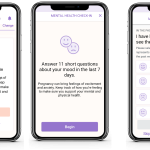A program that uses meditation, yoga and other mindfulness techniques could reduce stress and anxiety during pregnancy for those at high risk of stress-related negative birth outcomes, such as preterm delivery and low birth weight, according to preliminary research.
In a pilot study, published recently in the Maternal and Child Health Journal, researchers from Magee-Womens Research Institute and Thomas Jefferson University designed a six-week mindfulness in pregnancy program for people at higher risk of preterm birth, including Black women, those on Medicaid and those accessing substance use disorder treatment. Participants reported a drop in stress levels after completing the program, a promising finding that lays the groundwork for a larger study.

Dr. Janet Catov
“Certain groups of women carry a bigger burden of stress due to a variety of social factors, such as poverty and discrimination,” said Dr. Janet Catov, senior author of the study and associate professor of obstetrics, gynecology and reproductive services and epidemiology at the University of Pittsburgh School of Medicine. “We developed a version of a mindfulness-based pregnancy program tailored to these women. Our findings are encouraging because they show that the program is feasible and may be beneficial in reducing stress.”
A growing number of studies suggest that a practice called mindfulness that encourages people to be present in the moment and aware of their inner thoughts and feelings can help reduce stress in pregnancy, with potential benefits for mom and baby, but traditional mindfulness programs may be difficult to access for women at highest risk of poor birth outcomes.
According to Catov, most mindfulness programs are conducted on weekends, outside of prenatal care visits and have tuition costs, which are potential barriers to expectant mothers with varied work schedules and limited income. With an eye toward accessibility, the team — led by mindfulness expert Dr. Diane Abatemarco, professor of obstetrics and gynecology and director of maternal addiction treatment, education and research at Thomas Jefferson University — developed a program that was shorter and integrated into prenatal care. Sessions were held at an urban OB/GYN office, and program topics were tailored to be culturally sensitive.
The team enrolled 35 women in the program, which consisted of six two-hour sessions. Led by a trained mindfulness instructor, the sessions incorporated meditation, yoga, relaxation techniques, breathing exercises and group discussion about stress and pregnancy. The participants completed questionnaires to assess stress, anxiety, depression and mindfulness prior to the first session, after the last session and within three months post-partum.
Participants reported reductions in pregnancy-specific stress and depression as well as increases in mindfulness, and these benefits were seen both immediately after the program and in the months following birth.
“We were a bit surprised — in a good way — by the lasting impact of the program on stress measurements, even after delivery,” said Catov. “Mindfulness could be a lifelong skill that has the potential to impact health far beyond the nine months of pregnancy.
“Mindfulness is more than relaxation. It’s about going within to connect with our own bodies and minds in the present moment,” she continued. “It allows us to be less drawn into our worries about the future or nervousness about the past.”
Importantly, participants expressed that they enjoyed the program, said Catov.
“I think the most important takeaway from this study is that this is something women are open to and interested in,” she said. “It encourages us to continue this research.”
In the future, the researchers have plans for a larger mindfulness-based intervention study that will measure maternal health and birth outcomes. They are also interested in integrating mindfulness sessions into OB/GYN clinical settings.
“Developing mindfulness programs for the most at-risk patients is a brand-new area,” noted Catov, “and our study is just step one.”
Haylee Baxendell is a Ph.D. candidate in the University of Pittsburgh School of Medicine’s Program in Microbiology and Immunology. She is participating in the UPMC Science Writing Mentorship Program.









